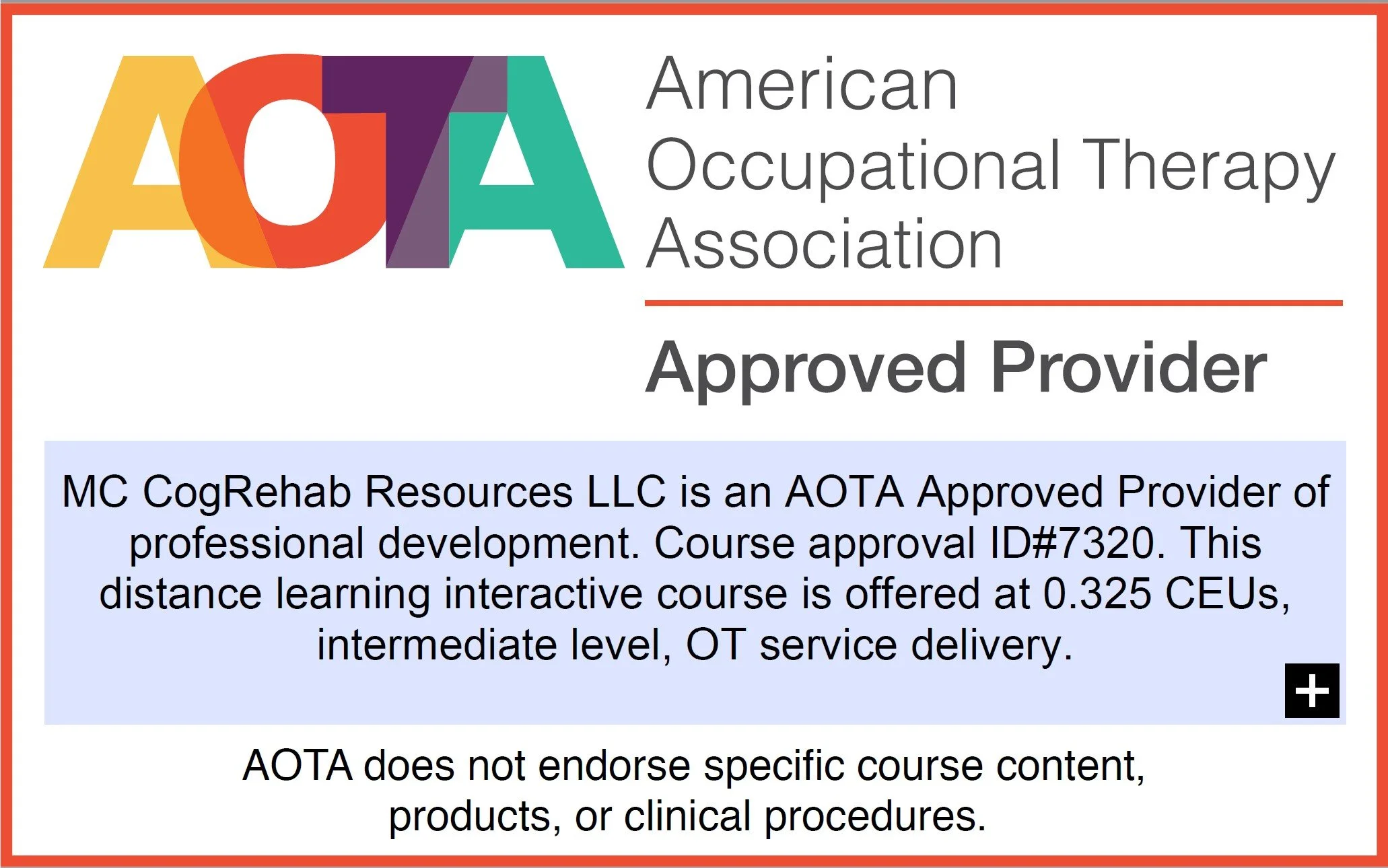Description: This live virtual session will review evidence-based treatment methods that can be integrated into functional activities to enhance outcomes for individuals with spatial neglect. There will be a particular focus on the use of Prism Adaptation methods and a Metacognitive strategy (Multicontext) approach to enhancing spatial exploration within everyday activities. The advantages and limitations of each approach will be discussed along with the client characteristics, that might be best suited for different approaches. Clinical cases, problem-solving, and videotapes of clients will be integrated throughout the workshop. This course requires participation in small group activities such as break-out rooms, completion of worksheets, polling questions, and interactive discussions with the use of the chat feature to assess the learning outcomes stated below.
Prerequisite: This course requires completion of Part 1: Spatial Neglect and Assessment Methods
Audience: For Occupational Therapists or other Health Professionals who have at least 1 year of experience working with adults with stroke or other acquired brain injury. Content level is Intermediate.
Instructors: Joan Toglia PhD, OTR/L, FAOTA and Peii Chen, PhD
CEUs: Contact hours for this course are 3 hours and 15 minutes (not including a 15 minute break) or .325 CEUs
Dates and Times: All course times are New York or Eastern Time (ET)
Friday, January 24th, 2025, 9:00 am - 12:30 pm
Course Fee: $115.00
Course Outline
Overview and prism adaptation treatment (Peii Chen) (75 min)
Recap on the mechanism and definition of spatial neglect
Evidence-based treatment principles and options
Prism adaptation treatment and how to integrate PAT into clinical practice to achieve functional outcomes
Awareness and metacognitive strategy approach to spatial exploration (Joan Toglia) (90 min)
Overview of the multi-context approach
Integration of metacognitive strategy methods within functional activities
Case examples/ applications and case problem solving
Comparison of Approaches and Combinations of intervention (Joan Toglia & Peii Chen) (30 min)
Learning Outcomes
1. Observe two case scenarios reflecting OT practice, and analyze the application of at least two key prism adaptation treatment principles.
2. Analyze, identify, and provide three potential solutions to barriers to implementing prism adaptation treatment in your facility.
3. Given a case scenario, generate metacognitive prompts for facilitating self-awareness and functional performance
4. Select at least 2 functional treatment activities that reflect the horizontal transfer continuum used in the Multicontext approach.
5. Given a case scenario, discuss the application of at least two evidence-based treatment options within the context of OT practice.
Sample WORKSHOP PARTICIPANT COMMENTS
There is a lot that I learned that I can implement in my practice with little or no expense. Thank you very much for a wonderful course!
I really appreciated the outline that you presented - differentiating between implicit and explicit interventions. It helps with clinical decision-making and problem-solving. Well done!
This course provided practical applications (internal/external methods) that I can use right away other than "Look left!"
The comparison of implicit and explicit strategies was very helpful. I was not aware of many treatment options and am excited to try to use them!
I found the supportive guided questions of the metacognitive approach to be most useful along with the creative ideas for activities to practice those skills.
The examples of prism adaptation were very helpful along with the review of evidence for approaches (or lack thereof!)

